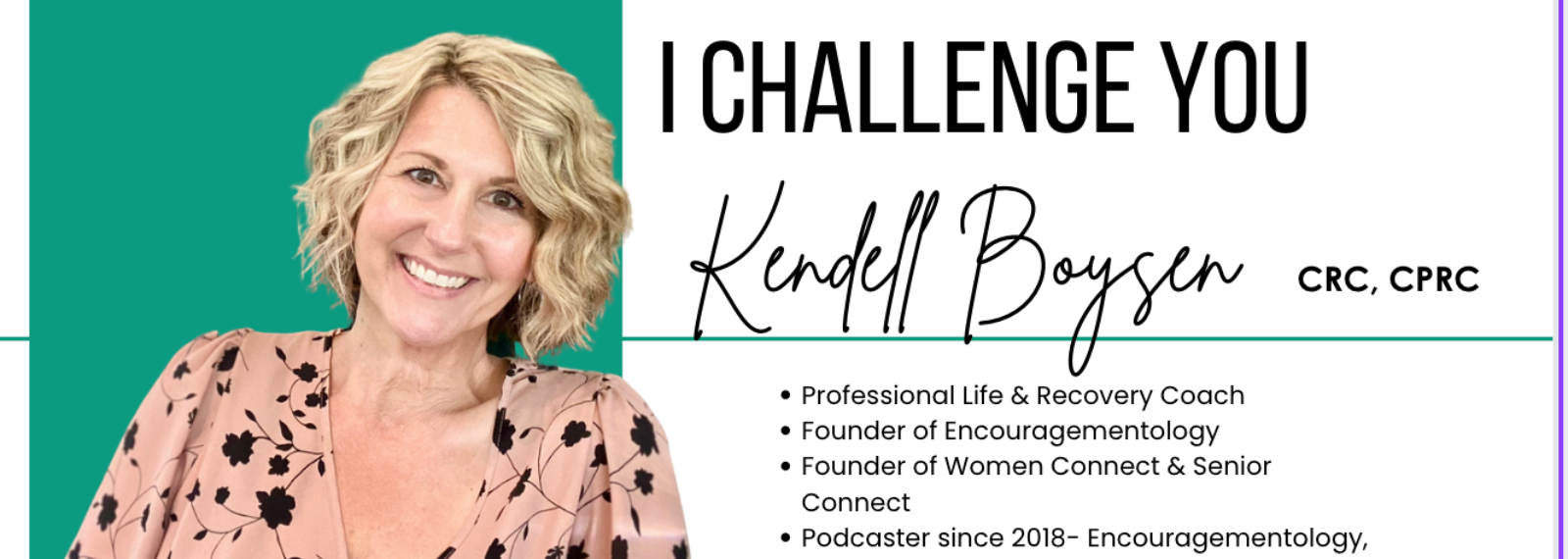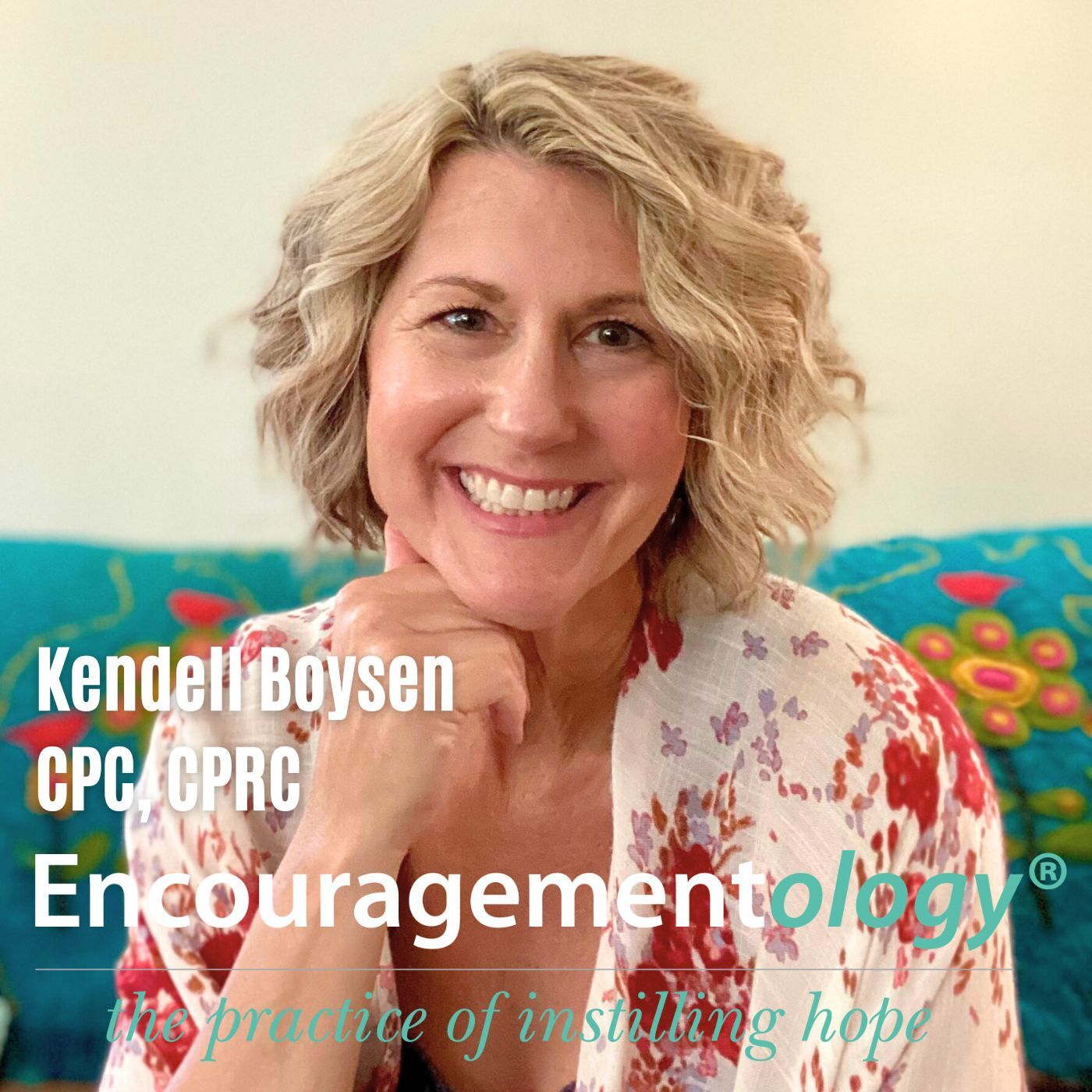Episodes

Thursday Jul 24, 2025
Enjoy the Ride: How to Stop Rushing Toward What’s Next
Thursday Jul 24, 2025
Thursday Jul 24, 2025
SHOW NOTES:
On this show…we’re talking about how to stop rushing toward “what’s next” and start enjoying the ride. Have you ever caught yourself racing through life, so focused on the finish line that you barely notice the scenery around you? It’s easy to fall into a pattern of “when I get there, then I’ll be happy,” only to find that there keeps moving further away. Whether it’s the next promotion, the next milestone, or just the next weekend, we’re often living for the future—and missing the now.
In this episode, we’ll explore what it means to slow down and actually enjoy the journey. We’ll talk about how to balance ambition with presence, how to check in with yourself along the way, and how to set future goals that honor where you are today. The road may be long, but it’s filled with meaning—if only we’ll pause to take it all in.
Why are we always in such a hurry to “get there”? Wherever there may be—financial security, a relationship milestone, a certain job title—we often place so much pressure on the end goal that we forget to live on the way to it. It’s like being on a beautiful scenic drive, but instead of taking in the views, you’re glued to the GPS. Focused. Determined. Unavailable.
This urgency often stems from our culture’s obsession with productivity and achievement. From a young age, we’re taught to aim high, set goals, and never stop climbing. And while ambition can be a healthy motivator, it can also become a thief—stealing joy from our present moments and creating anxiety about a future we can’t fully control.
Have you ever reached a long-awaited milestone only to feel let down afterward? Like the buildup was more thrilling than the arrival? That’s a sign you might be living for the next thing instead of enjoying the current one. When we’re constantly chasing what’s ahead, we miss opportunities for connection, reflection, and simple joy that exist right now.
The truth is, the destination is only part of the journey. And ironically, the real transformation happens along the way—in the delays, the detours, the conversations, and the quiet moments of self-discovery.
So let’s slow down for a second. What if you already are becoming who you’re meant to be? What if rushing is keeping you from noticing how far you’ve actually come?
There’s nothing wrong with wanting more. Goals give our lives direction, motivation, and meaning. But if we’re not careful, they can also become blinders—blocking out everything that isn’t the finish line.
Ambition says, “Keep going, you’re not there yet.”
Presence asks, “But aren’t you here now?”
Goals Are Not a Destination, They Are an Invitation
Mindfulness and Being Present in the Moment
For People Feeling Behind In Life
CHALLENGE: Take a breath and look around—what beauty, progress, or peace might you be missing in your race to the finish line? Give yourself permission to slow down and be fully present for the moments that are happening right now.
I Know YOU Can Do It!
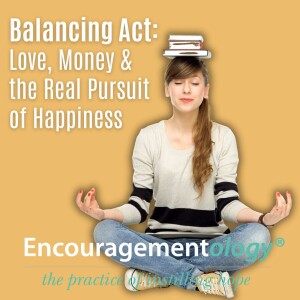
Thursday Jul 17, 2025
Balancing Act: Love, Money & the Real Pursuit of Happiness
Thursday Jul 17, 2025
Thursday Jul 17, 2025
SHOW NOTES:
On this show… we’re exploring the balancing act between love, money, and the real pursuit of happiness. What happens when one area becomes the focus at the expense of the others? You might be building wealth but losing touch with your relationships, or maybe you’re all-in for love but silently stressed about your financial future. It’s easy to get off-kilter, especially when life demands you juggle multiple priorities at once.
The truth is, balance often becomes obvious only in hindsight. But what if you could spot the imbalance before it knocks you over? That’s exactly what we’re diving into today. We’ll explore the emotional, financial, and personal fulfillment areas of your life—and ask the hard questions about where your energy is going and what’s being left behind. We’ll even introduce a tool coaches use to help people evaluate where they are versus where they want to be. So whether you’re feeling stretched thin, stuck in a loop, or just curious if you’re truly chasing happiness—or just running on autopilot—this show is for you.
Let’s be honest—how many of us are secretly chasing that idea of “having it all”? The fulfilling relationship, the comfortable income, the deep sense of inner peace and purpose. Somewhere along the way, we were sold the dream that it’s not only possible—but expected. And if we don’t have it all together, we must be doing something wrong.
But what if the pressure to have it all is what’s keeping us stuck?
Start by thinking of your life like a three-legged stool: one leg for love and connection, one for financial security, and one for personal fulfillment or happiness. When any one of those legs is too short—or completely missing—the stool becomes unstable. You wobble. Maybe you fall. And chances are, you’ve blamed yourself for the imbalance instead of realizing that no one taught you how to build a strong stool in the first place.
5 Steps to Reset Your Work-Life Balance
Achieving Balance: Why You’ve Got it Wrong & How to Get it Right
There's more to life than being happy | Emily Esfahani Smith | TED
CHALLENGE: Take a closer look at where you’re investing your energy—love, money, happiness—and ask yourself what might be running low. A small shift in focus could be all it takes to restore some balance. You deserve a life that feels full, not just busy
I Know YOU Can Do It!
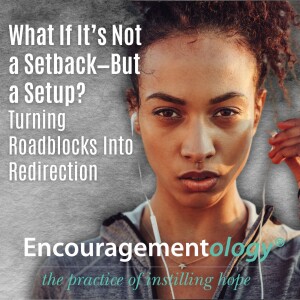
Friday Jul 11, 2025
What If It’s Not a Setback—But a Setup? Turning Roadblocks Into Redirection
Friday Jul 11, 2025
Friday Jul 11, 2025
SHOW NOTES:
On this show…we’re asking: What if your setback isn’t the end of the road, but a setup for something greater? Too often, we treat failure like a stop sign—something to fear, avoid, or be ashamed of. But what if it’s actually a signpost pointing us toward a better path, one we couldn’t have seen without the detour? This week, we’re flipping the script on disappointment and getting curious about the hidden wisdom in rejection, reroutes, and redirections.
Think about a time when something didn’t go your way—and now you’re secretly (or loudly) grateful. That job you didn’t get, the relationship that fizzled, the opportunity that slipped through your fingers…maybe that wasn’t a failure, but a filter. We’ll explore the difference between giving up and giving in, and how to know when you’re resisting growth or simply being rerouted to a better destination. Let’s dive in!
We’ll start by unpacking a few key terms and ideas that will help frame the rest of our conversation.
Setback – A setback is typically defined as an interruption in progress—a problem or delay that keeps you from moving forward as planned. It’s that moment when things don’t go according to script and you feel like you’ve hit a wall. Most of us interpret a setback as failure, rejection, or a signal to give up. But what if that interruption is really a signal to pause, recalibrate, or shift direction?
Setup – When we say a “setup,” we’re talking about a reframing of perspective. Instead of viewing the problem as a block, we start to see it as a preparation—a moment meant to teach us, shape us, or even protect us from something we can’t yet see. A setup can feel frustrating in real time, but it’s often that pivot point we later recognize as essential.
Giving Up vs. Giving In – These two sound similar but have very different meanings. Giving up means you stop trying—throw in the towel, close the book, walk away from the possibility. Giving in, however, is a more nuanced choice. It means you adjust. You yield to a new reality or modify the plan—not because you’re weak, but because you’re willing to grow. It’s not quitting the goal; it’s choosing a wiser way forward.
Reframing Failure – This is where the mindset shift begins. Instead of labeling failure as the end, we see it as a necessary part of success. Many people we admire failed multiple times before finding their true direction. Reframing means we no longer fear failure—we learn from it. We use it.
By grounding ourselves in these definitions, we give ourselves the freedom to move through life’s plot twists with a bit more grace—and maybe even a little optimism.
The Importance of Letting Go of Control
How to Deal with Disappointment
CHALLENGE: Stop labeling your setbacks as stop signs and start seeing them as scenic detours—opportunities to learn, grow, and arrive even more prepared. Trade the urge to give up for the courage to give in—to adapt, realign, and continue your journey with wisdom and grace.
I Know YOU Can Do It!
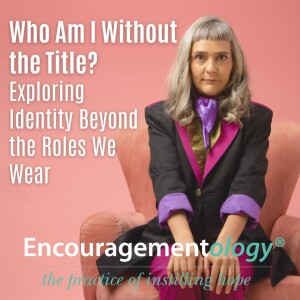
Tuesday Jul 01, 2025
Who Am I Without the Title? Exploring Identity Beyond the Roles We Wear
Tuesday Jul 01, 2025
Tuesday Jul 01, 2025
SHOW NOTES:
O n this show…we’re talking about identity—what it means, where it comes from, and who gets to define it. Ever stop to wonder who you really are when the titles fall away? It’s a strange thing—how we cling to labels like “parent,” “manager,” “helper,” or even “hot mess,” as if they were our full name. Titles can help us navigate the world, but when we rely too heavily on them, they can box us in or even blur the truth of who we are underneath.
n this show…we’re talking about identity—what it means, where it comes from, and who gets to define it. Ever stop to wonder who you really are when the titles fall away? It’s a strange thing—how we cling to labels like “parent,” “manager,” “helper,” or even “hot mess,” as if they were our full name. Titles can help us navigate the world, but when we rely too heavily on them, they can box us in or even blur the truth of who we are underneath.
We live in a world that loves a good label—it helps others understand us at a glance. But what happens when a role is stripped away, or worse, when we’re handed a title we never asked for? Maybe you’re the “strong one,” the “fixer,” the “people-pleaser,” or the one who “always knows what to do.” Do those titles empower you or exhaust you? Today, we’re peeling back the layers, giving ourselves permission to question, evolve, and maybe even rewrite the narrative of who we are—not based on what we do, but who we’re becoming.
Let’s start by defining identity. At its core, identity is the way we define ourselves and the story we tell—both to ourselves and to the world—about who we are. It’s made up of our beliefs, values, personality, memories, and experiences. But just as much, it’s shaped by our roles, labels, and the expectations that come with them.
Some parts of our identity we choose—our style, our goals, the things we’re passionate about. Some parts we inherit—like family roles, cultural values, or personality traits reinforced by others. And then there are pieces we don’t consciously claim at all—they’re just assigned to us over time. Maybe you’ve been labeled “the dependable one,” “the creative one,” or “the one who always has it together.” But who says you have to wear those labels forever?
One of the biggest identity traps is confusing what we do with who we are. Our jobs, titles, and responsibilities often become our main identifiers. “I’m a teacher,” “I’m a mom,” “I’m a CEO.” While those roles are important, they’re only part of the picture. When we base our entire sense of self on a role, we run into trouble when that role changes—or disappears. Retirement, career shifts, empty nesting, or relationship changes can leave us feeling lost, like we’ve misplaced ourselves.
Another layer? Social identity—how we are perceived by others and how we internalize that perception. Sometimes, we shape ourselves to meet expectations or avoid judgment. That means our identity isn’t always based on our truth, but on what feels acceptable or praised. This isn’t inherently bad—it’s human nature—but left unchecked, it can disconnect us from our authentic selves.
So the big question becomes: Who are you, really? Beyond the titles, beyond the duties, beyond the outside validation—who is left?
How Our Identity Changes Throughout Our Life
Reflecting On and Evolving Identity at Any Age
Developing Your Self-Worth — Therapist Explains!
CHALLENGE: Strip away the labels and listen for your own voice. Instead of defining yourself by what you do or who others say you are, start exploring who you really are—and who you’re becoming—without the titles.
I Know YOU Can Do It!

Tuesday Jun 24, 2025
Find Your Voice—Without the Guilt Trip
Tuesday Jun 24, 2025
Tuesday Jun 24, 2025
SHOW NOTES:
On this show, we’re talking about what it really means to find your voice—without dragging along the guilt trip. Maybe you’ve been biting your tongue, nodding when you mean to shake your head, or saying “sure” when every fiber of your being is screaming “no!” Sound familiar? You’re not alone. So many of us, especially the people-pleasers and peacekeepers of the world, have been taught to smooth things over rather than speak up. But here’s the thing—your voice matters, and your truth deserves airtime.
Now, I’m not talking about shouting from the rooftops or steamrolling over others. This isn’t about turning into someone you’re not. This is about tuning into your own inner frequency and having the confidence to let it come through—clearly, calmly, and guilt-free. Whether it’s saying no without a 10-minute apology, standing up for something you believe in, or simply expressing your opinion without second-guessing yourself, this episode is for you. Let’s explore the sticky stuff that keeps us quiet—and learn how to speak up with grace, confidence, and self-respect.
Let’s start by defining the core ideas behind this episode—because “finding your voice” can mean different things depending on where you are in your personal journey. At its essence, finding your voice is about recognizing your thoughts, beliefs, and needs as valid—and having the courage to express them. It’s about being authentic, honest, and clear, without feeling like you need to water yourself down to make others comfortable.
Now let’s talk about why we don’t. One big reason? People-pleasing. This behavior often stems from a fear of rejection or conflict. If you grew up in an environment where keeping the peace meant keeping quiet, then you might equate speaking up with being “too much” or “too selfish.” Over time, that internalized guilt becomes the bouncer at the door, turning away your opinions before they ever make it to the surface.
And then there’s the Guilt Trip—that little voice in your head that says, “You should just let it go,” or “Don’t make this a big deal,” or “You’re probably overreacting anyway.” But that guilt isn’t always a moral compass; sometimes, it’s just conditioning. A signal that you’ve been taught to value harmony over honesty, even when honesty is exactly what’s needed.
We also need to clarify the difference between assertiveness and aggressiveness. Speaking your truth doesn’t mean shouting others down. Assertiveness is respectful communication—it’s saying what you mean, meaning what you say, and doing so in a way that doesn’t trample over someone else’s experience. That’s the sweet spot: clarity without cruelty, directness without drama.
So, if you’ve ever struggled to say “no” without giving an entire TED Talk in justification, or if you’ve nodded through conversations where you disagreed silently, just know—this episode is here to help you build that muscle. You’re not wrong for having an opinion. You’re not bad for needing boundaries. And you’re certainly not selfish for speaking your truth.
Stop the Guilt: 3 Ways to Take Back Your Power to Say No
When Guilt Keeps You From Setting Boundaries
5-Minute Guided Meditation to Find Your Voice and Speak Your Truth
CHALLENGE: Stop waiting for the perfect moment, the perfect words, or the perfect response—and just start speaking your truth. Not to please, not to appease, but to honor your own voice and values.
I Know YOU Can Do It!
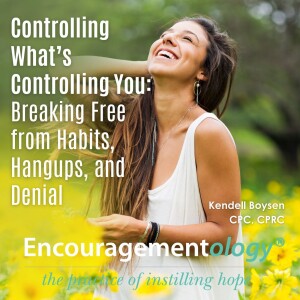
Tuesday Jun 17, 2025
Tuesday Jun 17, 2025
SHOW NOTES:
On this show… we’re exploring the sneaky ways we lose control—without even realizing we’ve handed it over. Have you ever found yourself doing something—again—and thinking, “Why do I keep doing this?” Maybe it’s late-night scrolling, that one more drink, the need to say “yes” when you’re screaming “no” inside. These patterns creep in, settle down, and before you know it, they’ve built a little nest in your life. We call them habits, but sometimes, they’re more than that. Sometimes they’re hangups, hurts, or full-blown addictions masquerading as routines. And here’s the kicker—they don’t just take up space; they slowly take the wheel. What if you’re not as in control as you thought? What if what you think is manageable is actually managing you?
Today, we’re going deeper—not to shame or scold, but to shine a gentle light. Because denial is tricky. It whispers that you’re fine, that it’s not affecting anyone else. But the truth is, what controls you, changes you. It touches your relationships, your work, your peace. And the hardest part? Admitting it. Facing yourself in the mirror and saying, “This isn’t working anymore.” But here’s the good news: awareness is the first, most powerful step toward freedom. So today, we’re cracking open the doors of truth with compassion, curiosity, and a roadmap to reclaiming your power.
Before we can take control back, we have to understand what we’re really dealing with. So let’s break it down.
Habit vs. Addiction
A habit is something we do regularly, often without thinking—like brushing your teeth or making coffee first thing in the morning. Habits can be helpful, neutral, or harmful. They’re built through repetition and reinforced by small rewards (hello, dopamine!). On the other hand, addiction takes things further. It’s compulsive. It’s often used to escape, numb, or gain relief. And it continues despite negative consequences. The line between habit and addiction can blur, especially when the habit becomes something we rely on emotionally or physically.
Denial and Self-Deception
Denial is a powerful defense mechanism. It protects us—from shame, fear, discomfort—but it also keeps us stuck. When we’re in denial, we minimize, rationalize, or outright ignore what’s happening. We say things like “It’s not that bad,” “I can stop anytime,” or “It’s not hurting anyone.” But these lies we tell ourselves can build a wall so thick that even when we’re suffering, we can’t admit we need help. The longer we stay there, the harder it is to see a way out.
The Grief of Letting Go
Yes, grief. Because even when we’re giving up something toxic, we’re still letting go of something familiar. This is where the Five Stages of Grief come into play:
- Denial – “This isn’t a problem. I’ve got this under control.”
- Anger – “Why do I even have to deal with this? It’s not fair.”
- Bargaining – “If I only do it on weekends, that’s fine, right?”
- Depression – “I feel helpless. I’m tired of trying and failing.”
- Acceptance – “This is real, and I’m ready to do something about it.”
We grieve because we’re changing. We’re letting go of the version of ourselves we thought we needed—and that’s not easy. But it is powerful.
The Invisible Impact
Here’s the truth: you don’t live in a vacuum. Whatever is controlling you—whether it’s overworking, people-pleasing, numbing, or isolating—it doesn’t just affect you. It impacts your energy, your presence, your relationships, and your potential. The scary part? You might not even know the full extent until you start making a change.
Habit vs Addiction: Understanding the Difference
The 5 Stages of Grief and Addiction
REWIRE YOUR BRAIN - Neuroscientist Explains How To Control Your Mind in MINUTES!
CHALLENGE: Name what’s been silently calling the shots in your life—whether it’s a habit, a hurt, or a hang-up—and meet it with honesty instead of avoidance. Then, take one small step toward releasing its grip, reminding yourself that you are not powerless, you are in progress.
I Know YOU Can Do It!
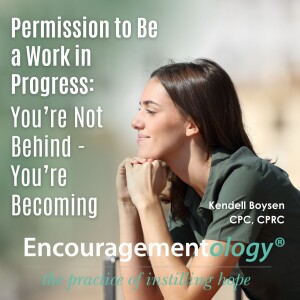
Tuesday Jun 10, 2025
Permission to Be a Work in Progress: You’re Not Behind – You’re Becoming
Tuesday Jun 10, 2025
Tuesday Jun 10, 2025
SHOW NOTES:
On this show… we’re giving ourselves permission to embrace progress—not perfection—as we unpack what it really means to be a work in progress. That nagging feeling that you’re somehow behind in life? Yeah, we’re going to challenge that head-on. Because maybe you’re not off track at all… maybe you’re right on time for your own becoming.
Have you ever looked around and thought, “Wait, am I the only one who doesn’t have this whole life thing figured out?” If so, you’re in good company. Today, we’re tossing out the illusion of perfection and replacing it with something more honest—grace. We’re rewriting the script that says we have to have it all together by now. Growth is rarely a straight line, and often looks like detours, backtracks, and a lot of figuring-it-out-as-we-go. And you know what? That’s progress too.
Let’s start with the pressure-packed elephant in the room: the idea that by a certain age, milestone, or calendar year, you should have it all figured out. You know—career locked in, relationships thriving, finances flawless, personal growth tied up with a vision board and a bow. But here’s the thing: that timeline? It’s mostly made up. There is no one-size-fits-all path to life, and the myth of “being behind” is usually just a snapshot of comparison dressed up as truth.
At its core, being a work in progress means allowing yourself to exist in a state of growth—unfinished, evolving, and completely valid. It’s understanding that who you are today is not the final version of you, and that’s not a flaw… it’s the point. But we often confuse progress with perfection—as if our worth hinges on having reached some invisible finish line. The truth is, progress is messy. It’s filled with doubts, mistakes, detours, and sometimes a hard reset. But it’s also evidence that you’re showing up, learning, stretching, becoming.
Let’s define a few key terms that will guide this conversation:
- Progress: A forward or onward movement toward a destination—even if that movement includes baby steps, backslides, or breathers.
- Self-compassion: Treating yourself with kindness when you fall short, instead of defaulting to criticism.
- Reinvention: The courageous act of choosing again. New path. New dream. New you.
- Comparison trap: That sneaky voice whispering “you should be further along” based on someone else’s highlight reel.
It’s all about embracing grace. The grace to change. The grace to learn. The grace to say, “I’m not where I want to be…yet—but I’m still becoming.”
Progress Not Perfection Is a Reasonable Goal
Stop Comparing Yourself Negatively to Others
This is a Poem about Perfectionism by Ginelle Testa
The Problem With Perfect - Motivational Video
CHALLENGE: Trade perfection for progress and meet yourself with grace in the messy middle. Don’t wait until you feel “ready”—start now, with what you have, and who you are, because the journey only begins when you do.
I Know YOU Can Do It!

Wednesday Jun 04, 2025
Read the Chapter You’re On: Embracing the Present in Life’s Ongoing Story
Wednesday Jun 04, 2025
Wednesday Jun 04, 2025
SHOW NOTES:
On this show…we are going to stick to reading the chapter we’re on by embracing the present in life’s ongoing story. Have you ever found yourself mentally rewriting chapters of your past or trying to peek ahead at pages you haven’t reached yet? It’s human nature to replay moments we wish had gone differently or to worry about what’s coming next. But while we’re busy editing old plotlines or predicting future twists, we miss out on the beauty and clarity of the chapter we’re actually in—the one unfolding right now. This week, we’re exploring what it means to truly read the chapter you’re on. No skipping ahead, no flipping back, just being present and fully engaged in this current moment of your life.
As seasons shift—both outside our windows and inside our souls—we’re faced with transitions that can stir anxiety, grief, anticipation, and hope. Maybe you’re watching loved ones age, adjusting to a new phase of your career, or coming to terms with blessings that also carry weighty responsibility. Today, we’re going to explore how to stay grounded in the now while honoring where you’ve been and where you’re going. So grab your favorite journal, take a deep breath, and let’s begin reading…right where you are.
Let’s start by defining what we mean when we say, “Read the chapter you’re on.” It’s more than a catchy metaphor—it’s a mindset. Just like reading a book, life unfolds one chapter at a time. But unlike a novel, we don’t get to flip ahead or rewrite the past. Yet many of us try. We revisit regrets, get stuck in nostalgia, or anxiously attempt to predict and plan for a future we haven’t reached. And when we do that, we lose our place in the present.
- The Illusion of Control
We often try to manage uncertainty by overplanning or ruminating—believing that if we just think hard enough, we can control the outcome. Spoiler alert: we can’t. While planning and reflection have their place, they become distractions when they rob us of the ability to fully engage with what’s happening right in front of us. - The Power of Presence
Being present doesn’t mean ignoring your past or avoiding your future. It means recognizing that this moment—right now—is the only place where action and awareness can occur. This is the chapter where your growth is happening, your relationships are deepening, and your story is taking shape. - Life’s Seasonal Shifts
Just like nature, we experience seasons: beginnings, growth spurts, stagnation, harvests, and even endings. These aren’t just age-related; they’re emotional and spiritual seasons too. Recognizing the chapter you’re in allows you to meet it with curiosity instead of resistance. Are you in a chapter of learning? Rest? Rebuilding? Joy? When we know what season we’re in, we can better understand what’s being asked of us.
Living in the present is not about staying stuck—it’s about giving your full attention to where you are so you can move forward with clarity and intention. Once you identify the chapter you’re in, you can start to ask the important questions: What is this chapter trying to teach me? How can I grow here? What do I want to carry forward—or leave behind—when the page turns?
How Present-Moment Awareness Can Make Life More Meaningful
These 6 mindful ‘micro-practices’ can help you be calmer and happier, including 3 you can do at work
Surrendering to the Present Moment | Eckhart Tolle Teachings
CHALLENGE: Slow down and truly inhabit the moment you’re in. Stop flipping pages in your mind and instead, take a breath, read the chapter you’re living—savor the words, the lessons, and the blessings right here, right now.
I Know YOU Can Do It!
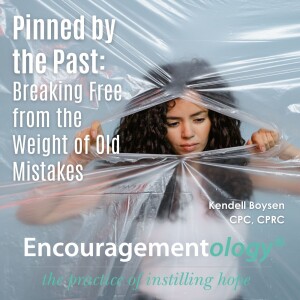
Tuesday May 27, 2025
Pinned by the Past: Breaking Free from the Weight of Old Mistakes
Tuesday May 27, 2025
Tuesday May 27, 2025
SHOW NOTES:
On this show…we are breaking free from the weight of old mistakes by unpinning ourselves from our past. Ever feel like no matter how much you grow, your past keeps showing up like an old playlist you didn’t ask to hear again? You’re finally moving forward—changing your habits, setting boundaries, maybe even feeling hope—but suddenly, wham, a memory, a regret, or a “what-if” slams into your progress like a closed door. I recently came across this line in a book that hit me right in the heart: “I was a butterfly pinned by my wings to the canvas of my mistakes.” That image has stuck with me. Because haven’t we all felt like that at some point—frozen, exposed, and unable to fly, not because we can’t, but because we’ve been too tightly tethered to the past?
In this episode, we’re digging into what happens when we stay stuck in past mistakes and how that mindset quietly shapes the way we see our future. We’ll explore how self-forgiveness isn’t just a feel-good idea—it’s a critical step in claiming your growth. We’ll talk about the emotional toll of living under an old narrative, how to begin rewriting it, and what it means to truly unpin yourself from your past. Ready to reclaim your wings? Let’s get into it.
Let’s start by talking about what it actually means to be “stuck in the past.” It’s more than just ruminating on old memories—it’s when your self-worth, decision-making, and ability to hope are shaped by events you can’t change. It might sound like: “I always mess things up,” or “I don’t deserve better because of what I’ve done,” or even “I’m not the kind of person who gets second chances.” That internal dialogue becomes a trap—one that feels like self-protection but slowly suffocates growth.
And the consequences? They’re sneaky. You avoid new relationships because of old heartbreaks. You turn down opportunities because you’re afraid of failing like you did before. You even stop dreaming because the you from the past already “decided” your limits. It’s like driving with the rearview mirror as your guide—and surprise, you’re missing what’s right in front of you. Being stuck in the past doesn’t mean you’re broken—it means you’re human. But healing means learning to thank your past for the lesson… and then gently close the book.
How to Let Go of Past Hurts: 8 Ways to Move On
Twelve Steps to Self-Forgiveness
You’re not behind. You’re not broken. And you’re definitely not defined by your worst moment. Every time you choose to show up, speak kindly to yourself, and take a step forward—you’re rewriting the story. And this time, you’re holding the pen.
CHALLENGE: Stop seeing your past as a prison and start viewing it as a chapter—one that shaped you, but doesn’t get to write your ending. Today, choose to unpin yourself from the canvas of old mistakes and start creating something new, bold, and beautifully unfinished.
I Know YOU Can Do It!

Wednesday May 21, 2025
Detaching with Love: Boundaries, Codependency, and Letting Go Without Giving Up
Wednesday May 21, 2025
Wednesday May 21, 2025
SHOW NOTES:
On this show…we are detaching with love as we learn the importance of setting healthly boundaries, explore the many faces of codependency, and understand how to let go without giving up. Have you ever felt like someone else’s happiness—or healing—was somehow your responsibility? Like if they were struggling, it meant you had to jump in and fix it, smooth it over, or carry it for them? If that sounds familiar, you might be brushing up against something I’ve wrestled with myself: codependency. For me, learning to detach with love has been one of the hardest, most freeing lessons in my healing journey. It doesn’t come naturally—I’m still working on it every day—but it’s opened up a whole new way of understanding relationships and responsibility.
Detachment doesn’t mean indifference. It doesn’t mean cutting people off or shutting your heart down. It means having healthy boundaries that say, “I love you, and I also know that your growth is not mine to manage.” For those of us who think in black-and-white, all-or-nothing terms, detaching without guilt can feel impossible. But this work—this shift in mindset—isn’t just for people dealing with addiction or dramatic relationship breakdowns. It’s for anyone who finds themselves overfunctioning, over-apologizing, or constantly carrying the emotional weight of everyone else. Let’s talk about what it means to detach, not with judgment or resentment, but with love.
At its core, codependency is about losing yourself in someone else’s needs, emotions, or dysfunction. It’s an emotional tug-of-war where you believe, often unconsciously, that someone else’s stability or growth depends on your constant involvement. You might take on the role of fixer, peacekeeper, rescuer, or even mind-reader. And while your intentions are loving, the results can be exhausting, confusing, and deeply unfulfilling.
Now—detaching with love might sound like an emotional paradox. How do you care without carrying? How do you show up for someone without stepping over the line and taking over? Detachment isn’t coldness or emotional withdrawal. It’s the intentional act of allowing others to face the consequences of their own choices, while protecting your energy, boundaries, and sense of self in the process.
Detaching With Love Is Good for Everyone - Sharon Martin, DSW, LCSW
Demystifying Co-dependency - S.M. Stray
CHALLENGE: Loosen your grip on what was never yours to carry, and instead, hold space—for your growth and theirs. Practice loving with open hands, not clenched fists, trusting that boundaries are not walls, but bridges to healthier relationships.
I Know YOU Can Do It!
